Fieldwork trip to Beilun Port
Posted: May 23rd, 2009 | Author: Ned Rossiter | Filed under: maritime industries | Tags: Beilun port, fieldwork, labour | No Comments »On a rainy March day this year my pleasantly small MA class of six students undertook the long anticipated fieldwork trip to Beilun – Ningbo’s shipping port – as part of our semester long study of urban systems and parallel economies to Ningbo’s creative industries. The day had largely been organized by the students, who arranged the hire of a mini-van and driver for the day, at a skilfully negotiated price of 200rmb (AUD$40). The choice of restaurant and authorisation to enter the port was also the result of the students’ contacts and local knowledge.
‘Intelligence is Actional’, declared the billboard that greeted our entry into the ‘free trade zone’ of Beilun. And on that note, we began our fieldwork with what has become a ritualistic highlight of these trips: lunch. This time we tried out a Taiwanese restaurant set beside a fake lake and cascading waterfall, though because of heavy rain (that continued throughout the day) we had our meal inside. With hints of spice and chilli (I even detected a kimchee-like mixture on the shredded tofu) interlaced with sweet basil, the meal was more carefully prepared (and pricier) than our usual fare. I wasn’t complaining. Toward the end of lunch, one of my more industrious and adventurous students had been busy on her mobile. The reason was now clear. As we finished up with one of those crazy looking soy-bean sweets embedded into a tower of ice, Mr Chen entered the restaurant to start off a series of meetings underscored by the logic of guanxi (special relations or networks).
Mr Chen is a fairly high-ranking worker at the Beilun Thermal Power Plant (China’s largest coal-fired power station which, incidentally, is a ‘green’ power plant, transforming its sulphur dioxide into gypsum material).1 We were in contact with Mr Chen due to the guanxi of one of my students, whose mother is friends with him. He seemed totally unfazed about taking the afternoon off to act as our tour guide. As the afternoon progressed, it became clear this was an exercise in consolidating his own guanxi with port officials, and we were the unwitting beneficiaries.
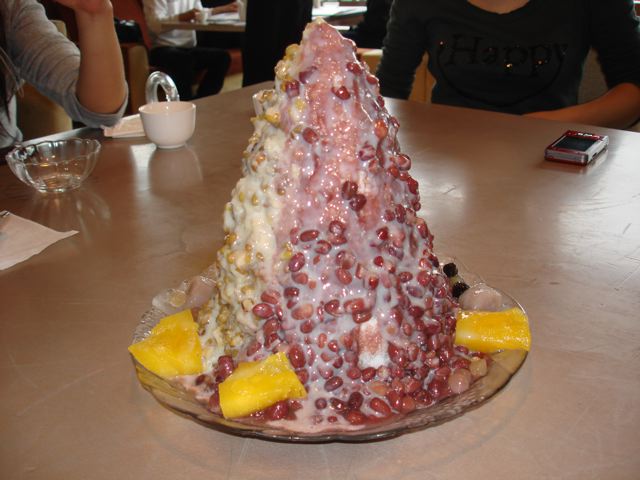
This tastes better than it looks
It’s necessary to enter the port with a car, or at least something that moves with a motor. Its scale is beyond the possibility of walking by foot, especially on a day defined by non-stop rain. First we call in at the police headquarters within the port. We need a permit in order to move about the port, and the students wonder if we’ll be accompanied by a police escort – it seemed Mr Chen had given that impression during the drive. As it turns out, the police aren’t too interested in us (nor in Mr Chen, it would seem), and we’re left to our own devices, and can roam wherever we like. At least that’s our perception of the arrangement.
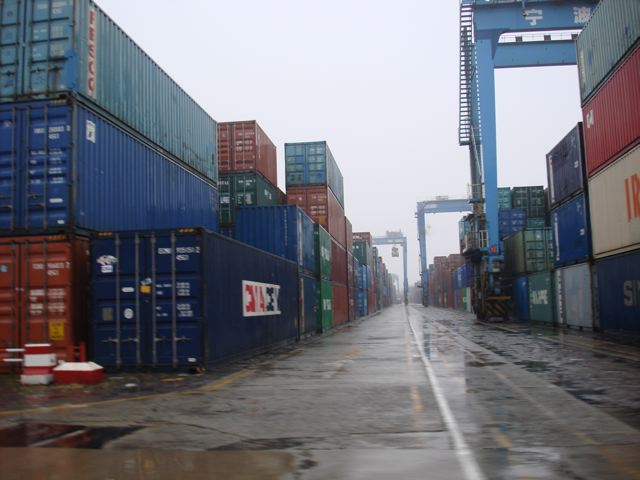
Kind of looks like an avenue in New York City or Chicago
Driving past stacks of containers organized in long rows arranged in grid-fashion, the impression of lonely canyons of buildings in a city’s finance district is distinct. We arrive at one of four loading docks. A few massive ships are lined up alongside container cranes. What’s striking is the seeming absence of workers. For one of the biggest ports in the world, there was surprisingly little activity – not a lot of movement of containers, and very few workers. But perhaps this shouldn’t be such a surprise – recent financial news reports on the savaging of the shipping industry over the past 6 months: shipping companies are collecting 75-80% less on the cost of transporting containers; charter rates have plunged to levels that no longer return profits, reproducing the falls in freight rates; smaller shipyards across China are being abandoned, with half-finished ships that will never be built; inventories of iron ore, electronics, textiles and sports shoes are among the many commodities piling up in the ports across China, with no market destination.2 Clearly, if you wanted to move goods across the oceans, now’s the time to do it with prices so low.
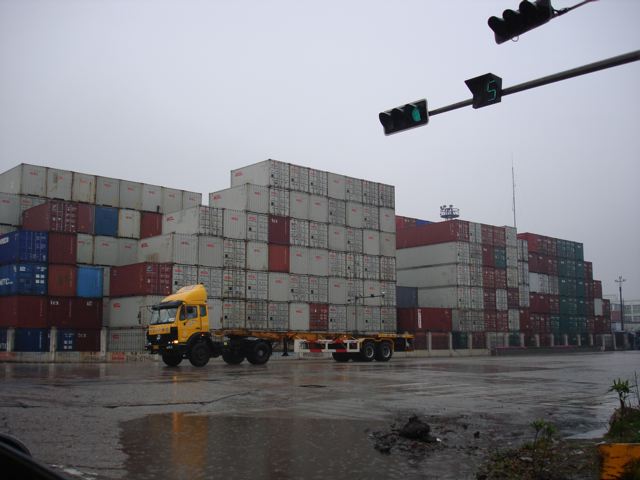
I find the grey appealing
The  Times notes ‘about 10 per cent of the world’s 10,650 in-service container ships and bulk carriers are currently sitting empty and at anchor waiting for cargoes that are simply not emerging’.3 This figure varies according to region of trade and the type of goods transported; around 25% of ships transporting ‘raw materials in the Pacific are now idle’.4 Many of these ‘parked’ ships are in waters off Malaysia, Indonesia and the Philippines,5 presumably because of cheap oceanic real-estate and less securitized waters than neighbouring China, Taiwan, South Korea and Japan.
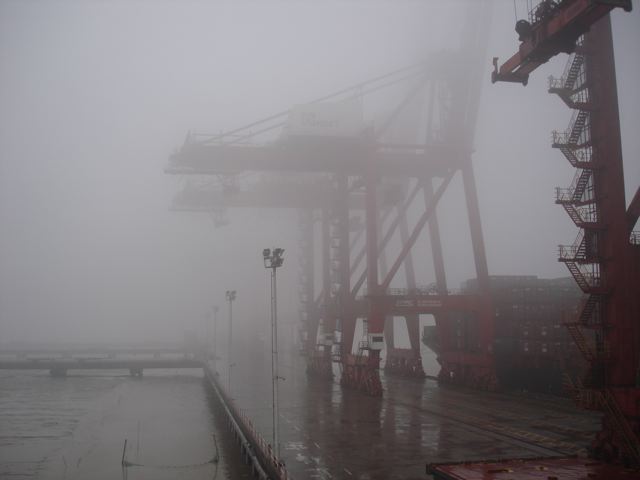
Heavy mist
The environmental waste connected to ‘mothballed’ ships is another disaster in the making, with toxic metals, fuel and cargo corroding into the ocean’s ecosystem. China has the world’s largest ship-breaking industry, and along with the high rates of death among workers caused by accidents and the inhalation of toxic fumes, further damage to the environment is highly likely.6 And it’s hard not to be alarmed at the prospect of electronic-waste from Europe piling up in the parking lots of Asia’s harbours with the collapse in e-waste industries. Perhaps now is a good time to be cutting back on visits to local seafood restaurants.
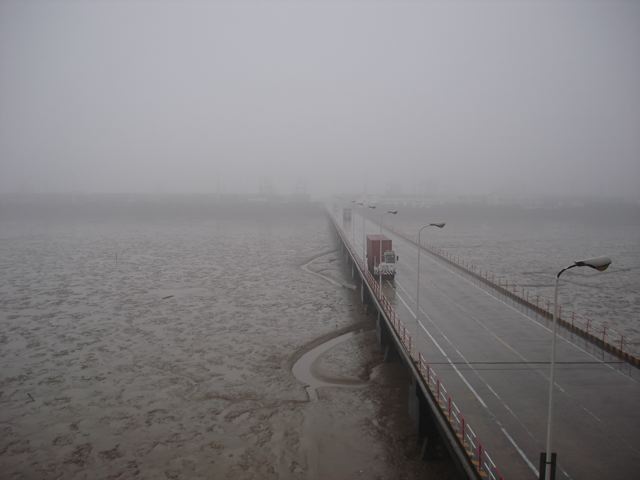
The low tides are attractive, with little gullies all over the place. You see them when you cross the Ningbo-Shanghai bridge as well
And what’s one of the primary causes of this rapid decline in the shipping industry? The banks, of course, who in their ‘mistrust and nervousness’ are refusing to pass on finance to an industry that depends on lines of credit in order to turn around deals and invest in infrastructure.7
Inevitably, such conditions bring us back to the question of labour, and it was a meeting with Ningbo immigration inspection officials that presented the occasion to hear more on this issue. While Mark Fisher, author of the hip marxist K-Punk blog, reads the invisibility of ‘human activity’ at his local Felixstowe port in Britain as an index of ‘the obsolescence of labour’ via the spectral future of ‘decommissioned robots’ herded into containers in Spielberg’s I, Robot, the immigration official at Beilun gave us another story.8 Like so many of the best meetings in China, this one seemed totally unplanned and without schedule – at least that was the impression we all had as our car pulled up unexpectedly outside the non-descript exterior of the immigration inspection building. No doubt Mr Chen intended to consolidate his guanxi with more of the port’s officials, but for us, the meeting was the bonus we had been hoping for – my own contact at Beilun in IT logistics had not been able to meet that day, which left us without a direct line of data on the operation of the port.
Without any real idea of what was going on, we were quickly ushered into a meeting room dominated by a large mahogany stained table with four uniformed officials looking more like mid-ranking army recruits than port immigration staff. The students proceeded in their usual no-nonsense manner to fire off questions, set up mp3 recorders, placing their cameras in video-mode, while the single female official served us cups of hot water. A larger, chubby official, looking slightly annoyed and distinctly unimpressed, proceeded in slightly unnerving fashion to video-tape everyone in the room, presumably as part of some kind of security documentation routine.
I started off by asking how many ships pass through the port each year. Before the financial downturn, 12,000 ships docked at Beilun (up from a comparatively tiny 1300 in 1997), with 200,000 personnel providing documentation to immigration authorities. On average, 60 ships arrived on a daily basis, but that number has dropped to 30-40 since November with the impact of the crash. Crews on the ships are ranked according to duties and responsibilities, with workers from the Philippines and India coming in at the bottom as AB’s (able seamen) and those from Central Europe – Greece and Denmark where the official’s countries of reference here – serving as OS (ordinary seamen).
To help clarify the range of nationalities and ranks of crews, I was provided with a print-out of a recent crew list of a Panama ship that had arrived from Botany Bay in Sydney a couple of days earlier. The list included crew member’s names, passport and seaman’s book details. All bottom ranking crew – from wipers, oilers, cooks, messmen and AB’s were Filipinos. But they also filled the ranks of more senior positions: 1st-3rd engineers, boatswain, OS’s and 2nd and 3rd mate. The top ranking crew were from Korea (chief engineer, 1st engineer, chief mate, and master) and India (chief officer and another chief engineer). Interestingly, all of the Korean crew were born in Busan and thus become subjects whose careers were in a sense determined by their place of birth in a port city. It was fascinating to see this list because it gave a concrete sense of how the population of shipping labour is managed and accounted for; the national profile of crew-members also seemed to contradict what the immigration official had just told me (though that discrepancy could just as easily been a problem of translation).
I was curious about illegal immigrants – stowaways, sans papiers, or refugees perceived undesirable.9 I thought the official might have some reservations about addressing such questions, but he showed no hesitation and rattled off his reply with the same gusto as any of the other questions we had. He seemed to relish this opportunity to break from the routine of paper work and was generous in his time and detailed responses. According to the official, Fujian (Taiwan or the Mainland province bordering Zhejiang, I wasn’t sure which though I guess it was the latter) presented the most cases of illegal migrants (I didn’t catch the number), and all were caught by authorities. We were proudly informed that not a single Chinese citizen had managed to escape undetected by Port security. Earlier in our tour, we had noticed a ‘Suggestions & Complaints Box’ fixed to the outside wall of a rarely used and now quite abandoned looking detention building located alongside one of the docks. Presumably this demonstration of managerial responsiveness gave those unfortunates who found themselves incarcerated the right of reply.
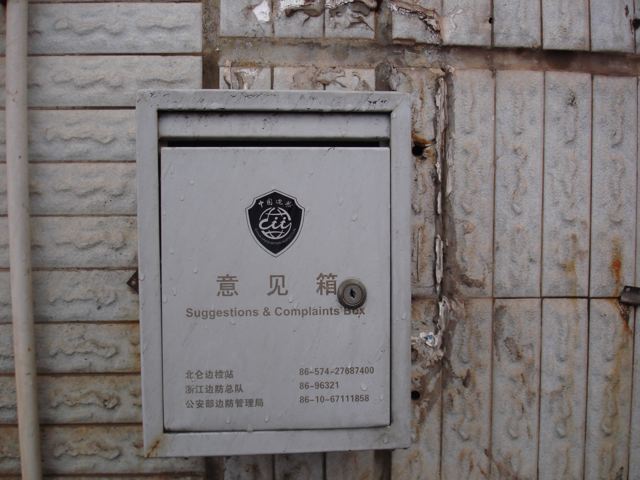
Suggestions & Complaints Box, stuck to the wall of the old detention centre
The opportunity for crew members to leave their ship and check out this edge of China was determined in the first instance by turnaround times for docked ships, which ranged from 4 hours to 3 days. Then, of course, it came down to the type of passport workers held. Again we were in for some surprises. Crew of Polish nationality (the example we were given) or any of the ex-Socialist states had the most flexible visas. They could get on the special shuttle-bus from the port and head into Ningbo (30-60 minutes away, depending on traffic and the route), and were permitted to move freely about the Zhejiang Province. But if you happened to be of US or British nationality, then bad luck: citizens from these countries had the most restrictions, and could travel no further than the port town of Beilun. If shipping crews strayed outside their designated zone and were caught by authorities, they would be looking at a fine of 500RMB (55euros), potentially followed no doubt by other more serious penalties or charges.
I asked whether strong trade relations determined the type of visa granted, wondering if for some weird and unbeknown reason the ex-Socialist bloc had a strong economy with China. No, I was told, the reason for these anomalies came down to China exacting revenge for the complications and restrictions faced by Chinese nationals when they travel to the US and Britain. So, it was all a matter of residual ideological tensions shaping contemporary immigration policies, and had nothing to do with the strength of export markets. The Cold War might just as well have never ended.
By now the interview had gone on for about 45 minutes, or maybe an hour. I had lost track, and immigration staff were starting to get restless. I lobbed two more questions at our gracious host: what do you consider the most challenging problems faced in your daily work, and what indeed does your daily work consist of? Paper-work and administration, was the decisive reply. This was becoming increasingly burdensome for a staff whose numbers had been steadily cut-back since 1997, when 27 staff worked in the office. Today there were 18 staff (though I counted around 8 at the time) following a decade of reforms, which had seen a transition from a government department to a service agency. I found this latter point hard to understand, since the officials here were all clearly dressed in military attire, and I couldn’t imagine the Chinese military had somehow been subject to the neoliberal logic of outsourcing and privatisation. The building we were in, with its functional blandness and cheap construction, had all the trappings of communist-era anti-aesthetics, or perhaps just a regular modern government building indifferent to the life of labour. Whatever its attributes – and they were few – it seemed far away from the ubiquitous tawdry glamour that defines service industries around the globe.
Addressing both my queries on the challenges of work and its routines, the immigration official quickly concluded our meeting by proudly declaring their job was one of managing people and transport – logistics, in other words, which struck me as unusual since there were numerous other companies and port authorities involved in such a line of work. No doubt the governance of people and things has multiple organs, and is less effective in the advent of monopolies of control. Of course the proliferation of organizational systems can also result in chaotic bureaucracies without protocols or standards of inter-communication. Finally, I am told in the last year there has only been one case of attempted smuggling of illegal drugs – heroin, by some desperate soul from South Korea.
The official’s mobile rang (perhaps from a colleague in the room next door, impatient with our presence), signalling the conclusion to our meeting. As we gathered our recording devices, one my students engaged in a private conversation with a junior ranking official of cute appearance. Later, she told me she had wanted to get the contact details of the immigration office so we could stay in touch and send them a thank-you gift. He was forthcoming, texting his private mobile phone number. He had informed her the staff get very little opportunity to meet with women. I thought she had done quite well, and was impressed by the effectiveness of her good-luck bracelet for ‘future love’ – one of four on her wrist (the others for money and health, the fourth I can’t recall) that she’d pointed out over lunch.
As the officials vacated the meeting room, and left us to our excited post-interview euphoria, we noticed a row of officer’s dress caps perched neatly above the locker cabinets. With idiotic excitement over the opportunity to engage in some cross-dressing, we donned them with speed and discretion for a round of photos. And then we left Beilun.
Notes
- Ding Qi, ‘Beilun Power Plant Embraces Clean Technology’, China Daily, 22 August, 2007. ↩
- See Thomas Schulz, ‘Global Crisis Hits Shipping Industry Hard’, Spiegel International, 5 December, 2008. See also Leo Lewis, ‘Worldwide Shipping Rates Set to Tumble 74%’, The Times, 8 April, 2009. ↩
- Lewis, ‘Worldwide Shipping Rates Set to Tumble 74%’, 2009. ↩
- Schulz, ‘Global Crisis Hits Shipping Industry Hard’, 2008. ↩
- Lewis, ‘Worldwide Shipping Rates Set to Tumble 74%’, 2009. ↩
- See ‘Ship-breaking Ordered Shut’, The Daily Star, 18 March, 2009. ↩
- Schulz, ‘Global Crisis Hits Shipping Industry Hard’, 2008. ↩
- K-Punk, ‘Anticapital After Containerisation’, 10 April, 2009. ↩
- On the policing of stowaways, see William Walters, ‘Bordering the Sea: Shipping Industries and the Policing of Stowaways’, borderlands: new spaces in the humanities 7.3 (2008). ↩

Recent Comments